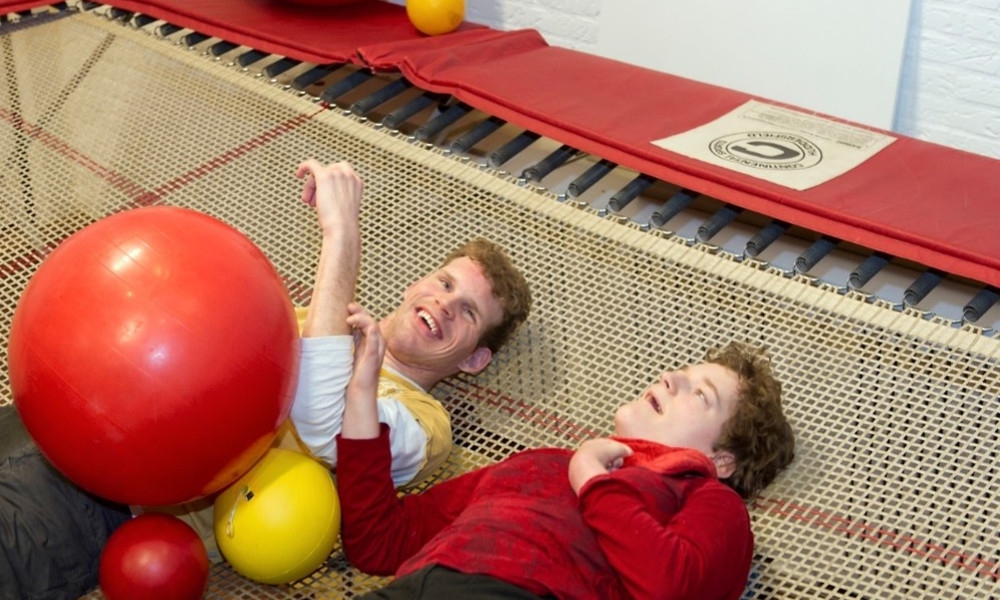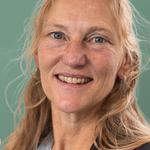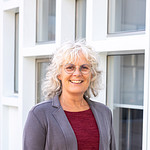Healthy living: you do it together
- Research stories

A lot of things come together in the Living Lab Healthy living for people with intellectual disabilities, with participation and health at the core. 'We research questions that come from the professional practice,' says professor Aly Waninge. 'Everything we discover through research is embedded in education and practice. Projects with practice-based scientific research follow one another. This way we always take the logical next step and we get ever closer to the heart of the matter with regard to successive topics. All this knowledge contributes to new developments and has impact on education and the professional practice.' Lecturer-researcher Dinette van Timmeren adds: 'Think of it as a lemniscate. One issue affects the other and that goes on and on, that’s what’s so beautiful. In this way, we are expanding our Living Lab more and more.'
Aly and Dinette are the joint leaders of the Living Lab. They got to know each other 10 years ago at Royal Visio, a centre of expertise for visually impaired and blind people that offers support with research, advice and guidance. Aly worked there as a physiotherapist for people with visual and severe intellectual disabilities. Dinette became a research supervisor for three nursing students. 'We discovered a shared passion to support people with serious multiple problems as optimally as possible,' she explains. 'That's when I also saw the point of doing a PhD in order to advance knowledge in this area.' Dinette obtained her PhD with her dissertation 'Physical health in adults with (very) severe intellectual and motor disabilities' in 2019. 'Dinette's PhD research gave us a foundation to build on,' says Aly. 'Many people still refer to her research articles.'
They started small. Each with its own Living Lab. Aly in the field of research and Dinette in the field of education. Their network continued to grow and last year they merged the two Living Labs into the comprehensive Living Lab Healthy Living of People with Intellectual Disabilities.
An important part of the Living Lab is the unique minor Strengthening Healthy Ageing in people with intellectual disabilities. This programme was developed together with the professional practice and MBO, HBO and WO education, and has a strong connection with the practice at all times. The group of participants is very varied. For example, there are students with a background in physiotherapy, nutrition, dietetics, orthopedagogy and nursing. Students with a lot, little or no experience. Unique is the mixed participation of students from the Alfa-college, Hanze and the University of Groningen.
‘We don't think in terms of higher and lower,’ Dinette explains. 'It is precisely the difference in knowledge and experience that works so well. Everyone is equal and learns from his or her own perspective and learning needs. I think that's very logical, but it didn't make it easy to set up the minor. There were a lot of organizational hurdles and financial obstacles. Still, I didn't find that a problem,’ Dinette says. 'It also brought a lot of new opportunities and collaborations. The minor has been running since 2021 and I am very proud that it has succeeded.' The minor is also continuing to grow. At the moment there is no collaboration with medicine yet, so the researchers are working on that now.
The minor prepares the interprofessionally trained professionals as well as possible for the professional practice. The client is central, he or she should have the best possible quality of life. 'In order to realise this, you have to take advantage of every opportunity,’ says Dinette. ‘The trick is to let the client's voice be heard. In education, every student learns to make his or her own treatment plan. As a result, a client is confronted with all kinds of different plans. Not convenient. In this minor, students learn to set common goals and actions. Interprofessional collaboration is very important for the practice.'
Student Sylvia Aardema, who took the minor, agrees. 'The best care is that which is provided together. Learning how to do this, is what is preparing us for our future work.' Sylvia works as a nurse at a daycare centre of the Alliade care institution. In addition, she studies nursing part-time. 'I chose this minor because of its multidisciplinarity. With my experience, I can show others the ropes, while I am also learning myself. At the daycare centre, I already work in a multidisciplinary way. A privilege. So for me, it's already normal. Here at the nursing programme, I'm looking for more in-depth knowledge.'
As a follow-up to her minor, Sylvia will do a graduation research within the Living Lab. Dinette and Aly supervise her from the Lving Lab. It will be a file research study of individual risk factors of constipation. 'I'm joining an ongoing investigation by my employer Alliade.' Aly adds: 'Sylvia immediately saw how important research into constipation is for the professional practice. Rightly so, because constipation is extremely common among people with intellectual disabilities. Alliade has been one of our partners since 2013 and has its own department of practice-based academic research. This gives them practical insights and they know which lines of research are important for their organisation.'
Sylvia's research proposal is ready. 'I experienced a lot of support during the programme,' she says. 'The employer's interests sometimes differ from those of mine as a student and as an employee. The employer wanted to start with file research. I found that difficult at first, but now I agree. Dinette and Aly gave me a lot of information, which made me understand the importance. What was good was that I did have the freedom to indicate that the employer may have wishes, but that I also have to be motivated for this. Fortunately, they were increasingly open to that. Dinette and Aly asked: what would you like to do? In doing so, they made me feel empowered.' Aly adds: 'Sometimes Sylvia had to get used to how things work. We helped her to formulate her research proposal in such a way that it contributes to education, research and practice. We get the questions from the professional practice and we make the connection with the research, so there is a common interest.'
This is generally how it works. 'We look at the target group, what it should bring to the student, what it means for professional practice and how it is interesting for research,' Aly says. 'Based on research, we look at where we stand and where there is still space for knowledge to be developed. We look for a suitable assignment from the education sector. And for the professional practice, the thesis must provide direct knowledge. That's so beautiful, you do it together.'
LEEV! is an ongoing four-year project with practice-based academic research within the Living Lab. In this project, organisations work on effective lifestyle support for people with disabilities. One of them is the Cosis care institution. Since September last year, research coordinator and senior advisor Rianne Steenbergen, PhD student-researcher Kirsten Lamberts and experiential experts Melissa and Patricia and their coach Annegreet van 't Hul, together with other stakeholders, have been working on LEEV! 'We want a healthy lifestyle for people with disabilities to become a matter of course. So it's easy, it's fun and it's delicious.'
'With Kirsten as a PhD student-researcher, we immediately benefit from the results in practice,' says Rianne. 'People from the organisation and experts by experience also contribute ideas. This makes it a really practical study.'
'I like to make healthier choices myself,’ says Melissa. ‘And I want to use my findings to enthuse others to do the same. Going for healthier choices together, each at his or her own level and appropriate to the person. That's the goal.' Melissa has a chronic illness. Since she stopped taking her medication, she has regained the energy to exercise. 'As a result, I lost 40 kilos. When I show pictures from the past, people think it's my twin sister,’ she laughs. 'It’s good to do something with your own hobbies in this situation. I used to do fitness and athletics, so I picked that up again. Rest is also important to me. Relaxing and watching a series on the couch is therefore also part of it. I'm discovering that balance for myself.'
'With LEEV! we support teams and clients by setting achievable goals that fit the place and person,’ says Rianne. ‘And that give them energy.’
Kirsten adds: ‘The aim is to increase the quality of life and participation. That is why we are also investigating the accessibility of lifestyle support in the region.’
‘For example, I’m making an overview of all sports facilities and support options,' explains Annegreet.
'An important point is the degree of dependence', says Kirsten. 'From supervisors and family, but also from a decreasing number of volunteers and budget, such as the personal transport contribution and the shopping budget. That is why we are also looking at what organisations can invest in so that people with intellectual disabilities can continue to participate.'
‘Together with Cosis we contribute to the development of a selection tool, which allows both client and professional to choose the right lifestyle support,’ Kirsten explains. 'We want to build this plan during this first year to make healthy lifestyle support possible. This will provide a solid foundation on which to create all the options for the selection tool. The information for this mostly comes from clients, who are happy to talk about their personal experiences with exercise and nutrition. Their cooperation is great. We combine all this knowledge with the input of healthcare professionals and families.'
To uncover lifestyle goals and conditions, they used questionnaires developed in previous research. Students and experiential experts also created new questionnaires. 'The residents of a location have assessed all the questions,’ says Patricia about her questionnaire ‘They thought it was quite clear. Due to my chronic illness, I have only been able to participate actively since this year. Before, I couldn't eat. Now that I finally can, I think it's too good to restrict myself with healthy eating in relation to my weight. That's why I choose activities. I have a horse, and even if I can't ride it, I have discovered that I can run with my horse. A healthy lifestyle should be fun and easy to keep up. The horse is clearly also happy because the ears point forward.'

Lector Participatie en gezondheid van mensen met een verstandelijke en visuele beperking

Docent-onderzoeker Academie voor Verpleegkunde
How satisfied are you with the information on this page?